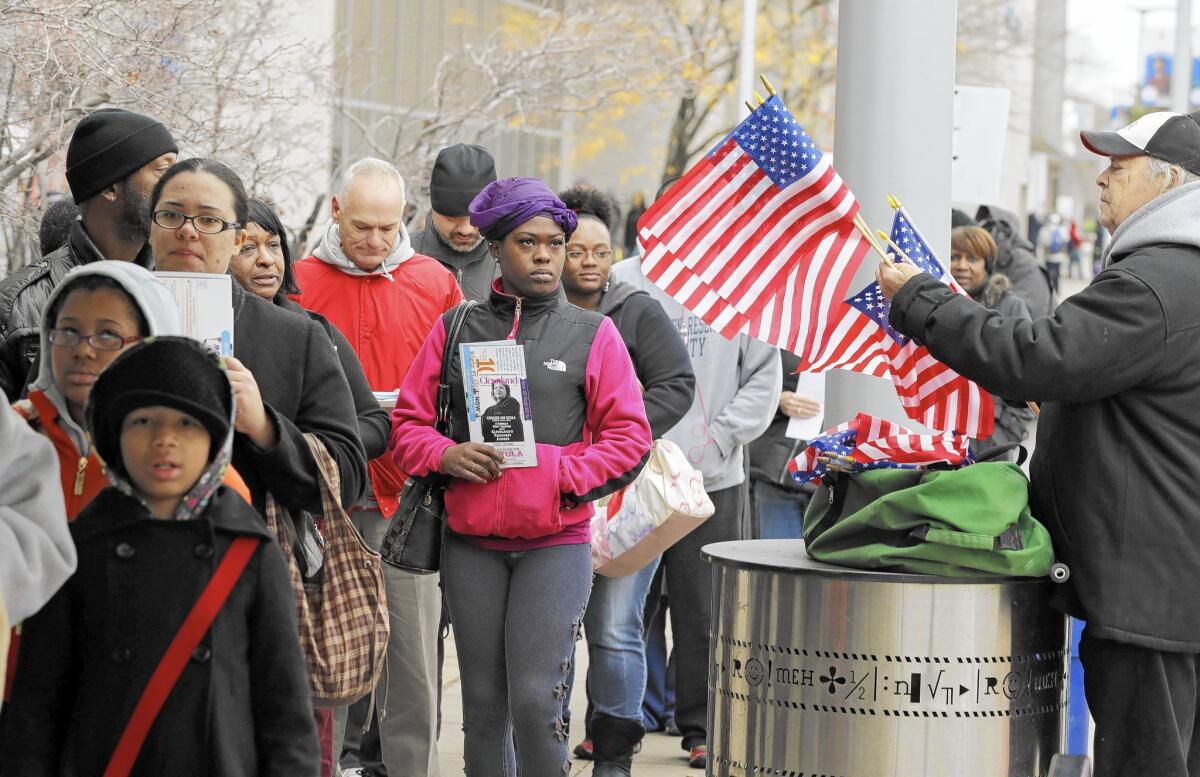Supreme Court grants Ohio’s request to shorten early-voting period

reporting from WASHINGTON — The Supreme Court ordered a halt Monday to early voting in Ohio that was scheduled to begin this week, clearing the way for the state to close polls on the Sunday before election day, when African American turnout has been heaviest.
The emergency order, approved 5 to 4, is a victory for Ohio Republicans and a setback for civil rights lawyers who had challenged a law that shortened the early-voting period by about a week.
------------
FOR THE RECORD:
Ohio early voting: An article in Section A on Sept. 30 about Ohio’s effort to curtail its 35-day early-voting period said the U.S. Supreme Court had allowed the state to cancel voting on the weekend before the election, including Sunday, when African American turnout is heaviest. The court’s emergency order did not address the final weekend, only the first week of early voting, when residents can register to vote and cast a ballot on the same day. The court allowed Ohio to scrap the initial week. —
------------
Several other election-year disputes could reach the high court before November. Wisconsin, Texas and North Carolina also face pending court challenges to Republican-sponsored voting restrictions that take effect this year.
Ohio had adopted one of the nation’s most generous early-voting policies after what was widely considered to be an election day debacle in 2004, when voters waited hours in long lines to cast ballots and many cities did not have enough voting machines to accommodate the turnout.
The state’s remedy was to open polls early and allow voters to cast ballots for the 35 days leading up to election day, including on weekends. At least in part because of minorities’ turnout, Ohio went for Democrat Barack Obama in 2008 and 2012.
In 2013, the Republican-controlled Ohio Legislature canceled the first week of early voting, during which residents could both register and cast a ballot at the same time. In addition, lawmakers canceled early voting on the three days before the election, including on Sunday, when turnout had been heavy.
Lawyers for the National Assn. for the Advancement of Colored People, the League of Women Voters and the American Civil Liberties Union sued in May, contending the cutbacks were targeted at the poor and minorities who traditionally vote Democratic. They noted that 157,000 Ohioans had cast ballots in 2012 on the early-voting days that were being eliminated under the new law.
A federal judge agreed with the challengers and blocked the cutbacks. The U.S. 6th Circuit Court of Appeals upheld his ruling last week.
Ohio Secretary of State Jon Husted appealed to the Supreme Court, urging justices to allow the new law to take effect.
“Ohio is a national leader in making voting easy,” he said, noting that polls will still be open on 28 days before the election. He said New York, New Jersey, Pennsylvania, Virginia and 13 other states did not open the polls before election day.
The Supreme Court issued a brief order Monday in Husted vs. NAACP, granting Ohio’s request and setting aside the rulings that had blocked the cutbacks.
The order was unsigned, but it spoke for the court’s five conservatives: Chief Justice John G. Roberts Jr. and Justices Antonin Scalia, Anthony M. Kennedy, Clarence Thomas and Samuel A. Alito Jr.
Four liberal justices dissented and said they would have denied the state’s request. They are Justices Ruth Bader Ginsburg, Stephen G. Breyer, Sonia Sotomayor and Elena Kagan.
Husted said he was pleased the law would go into effect. It means, he said, that “Ohioans will have 28 days of early voting, including two Saturdays and a Sunday.”
Dale Ho, director of the ACLU’s Voting Rights Project, said the order was a not a ruling on the legal merits of the issue, but would nevertheless “deprive many Ohioans of the opportunity to vote in the upcoming election.”
Rick Hasen, an election law expert at UC Irvine School of Law, questioned the legal strategy of voting rights advocates. “I think it was a mistake to bring this Ohio case,” he said. “I’m not convinced that it is a significant burden on voters to cut back a week off early voting, including the last Sunday.
“I’m worried this case will make bad law” and lead to more serious voting cutbacks in other states, he said.
More to Read
Sign up for Essential California
The most important California stories and recommendations in your inbox every morning.
You may occasionally receive promotional content from the Los Angeles Times.











